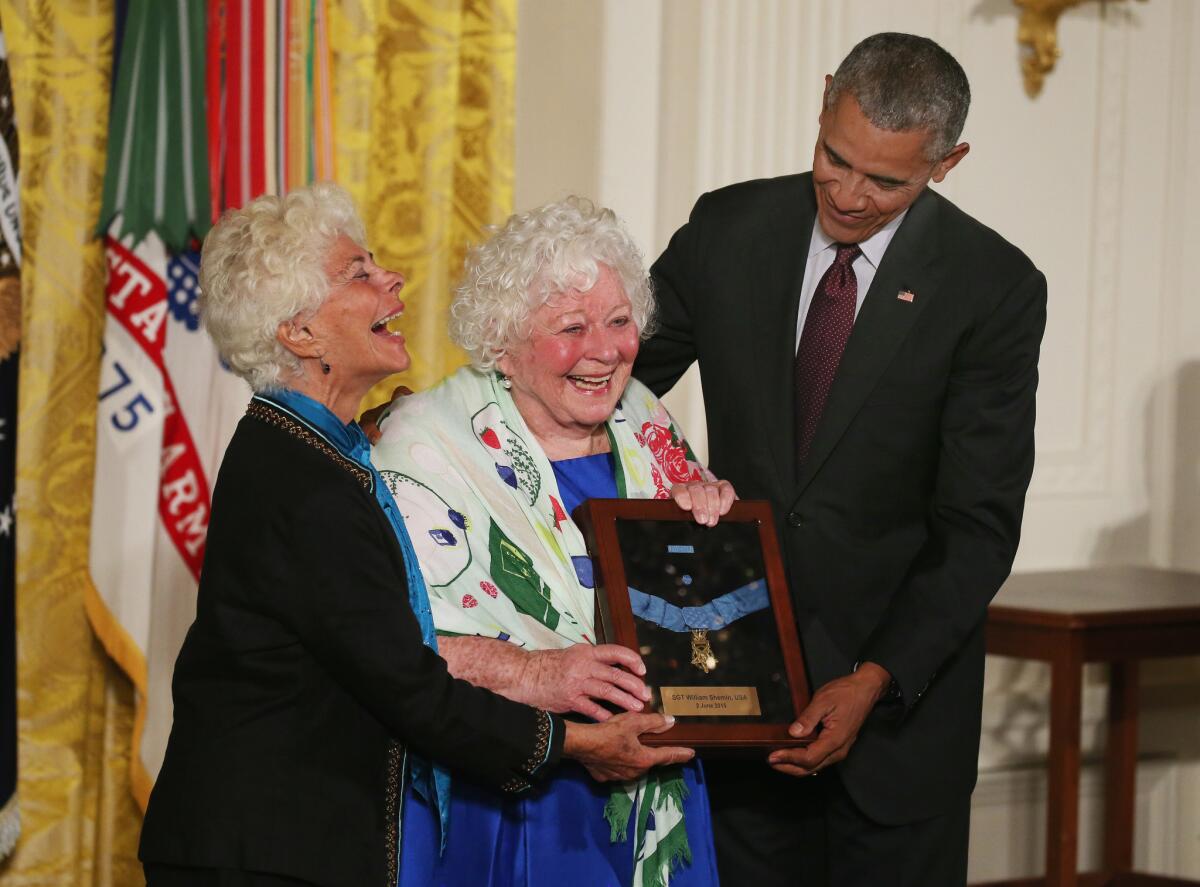World War I veterans, one black and one Jewish, awarded Medal of Honor

President Obama presents the Medal of Honor to Elsie Shemin-Roth, center, and Ina Bass, accepting on behalf of their late father, Army Sgt. William Shemin, for his actions during World War I. Obama also awarded a Medal of Honor to the late Army Pvt. Henry Johnson.
- Share via
Reporting from Washington — Army Pvt. Henry Johnson returned from World War I with injuries from a surprise German attack that he rebuffed, but received neither formal American recognition nor a disability pension.
Instead, when he later gave a speech that addressed racism in the armed forces, he was investigated by military intelligence.
Johnson, a member of the all-black 369th Infantry Regiment, was passed over for U.S. government honors for nearly eight decades. Finally, in 1996, after a long campaign by scholars and activists, he received a posthumous Purple Heart.
On Tuesday, President Obama gave him the military’s highest award, the Medal of Honor. The president blamed the lengthy delay on Johnson’s race.
Obama also awarded the Medal of Honor to Army Sgt. William Shemin for his World War I service, and alluded to Shemin’s Jewish identity when mentioning the extended wait.
“It has taken a long time for Henry Johnson and William Shemin to receive the recognition that they deserve. … We have work to do as a nation to make sure all our heroes’ stories are told,” Obama said.
The president outlined the long-dead soldiers’ heroism:
Johnson was standing sentry in the middle of a spring night in France in 1918 when Germans attacked him and a fellow soldier. With his companion wounded and his own gun jammed, Johnson continued to fight with a bolo knife, holding the line and stopping the Germans from capturing either of them.
The French government gave him a medal. The U.S. did not, but lauded him in military recruiting posters. Former President Theodore Roosevelt praised Johnson too, but his fame was short-lived. His battlefield wounds endured, and he could not find work after the war, Obama said. Johnson died at age 32.
“There was a refusal to recognize blacks in the way they should be,” said historian and New York University professor Jeffrey Sammons, who researched Johnson for a book he recently co-wrote. Sammons uncovered military memos detailing the investigation into Johnson’s 1919 speech discussing racism.
Johnson’s award “speaks to an effort on the part of scholars, historians, as well as activists more broadly to bring the history of African Americans in World War I to the public,” said Chad Williams, a professor at Brandeis University and an expert on African American military history.
Sgt. Maj. Louis Wilson of the New York National Guard accepted the award on his behalf. Some audience members wore hats with the words “Harlem Hellfighters,” a nickname for Johnson’s regiment.
He is only the second African American to receive the Medal of Honor for World War I service.
“America can’t change what happened to Henry Johnson,” Obama said. “We can’t change what happened to too many soldiers like him who went uncelebrated because America judged them by the color of their skin and not the content of their character. But we can do our best to make it right.”
Shemin, the second soldier honored, grew up in Bayonne, N.J. In 1918, he repeatedly exposed himself to enemy fire to rescue injured soldiers, Obama said. Shemin later took control of his platoon after the commanding officers were killed.
“Sgt. Shemin served at a time when the contributions of Jewish Americans in uniform were too often overlooked, but William Shemin saved American lives,” Obama said.
Shemin died in 1973. Two of his daughters accepted the award at the White House ceremony.
More to Read
Sign up for Essential California
The most important California stories and recommendations in your inbox every morning.
You may occasionally receive promotional content from the Los Angeles Times.













